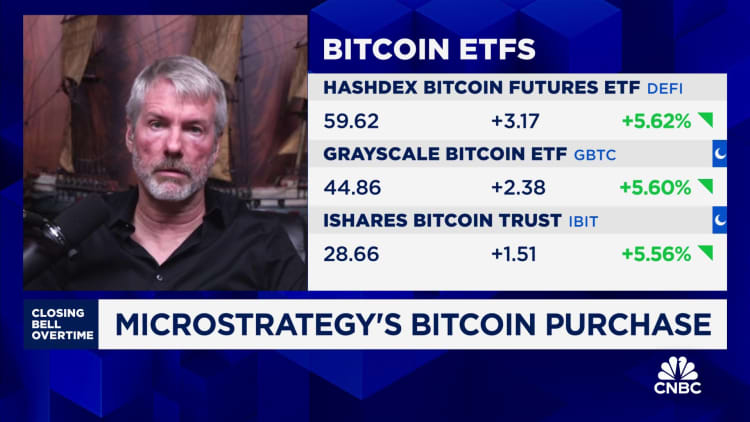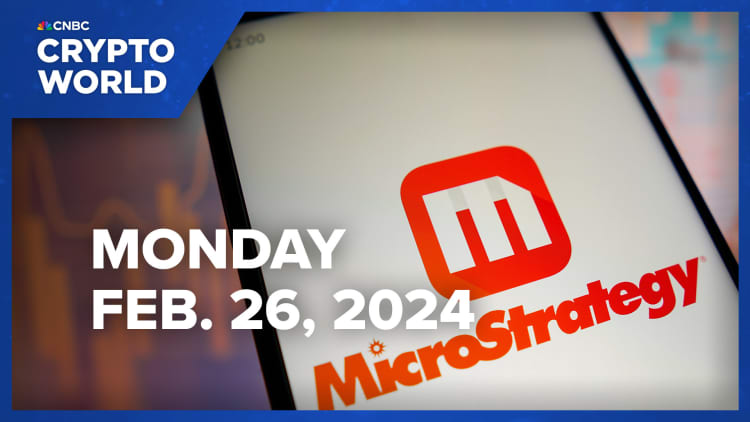MicroStrategy CEO Michael Saylor speaks at the Bitcoin 2021 Convention, a crypto-currency conference held at the Mana Convention Center in Wynwood on June 04, 2021 in Miami, Florida.
Joe Raedle | Getty Images
MicroStrategy‘s HODL strategy is continuing to reward investors.
The company said on Monday that it acquired an additional 3,000 bitcoins for a total of $155 million between Feb. 15 and Feb. 25. MicroStrategy, along with its subsidiaries, now owns about 193,000 bitcoins worth $11 billion.
Michael Saylor, the company’s chairman and ex-CEO and one of the cryptocurrency’s principal evangelists, touted the latest purchase in a post on X, noting that MicroStrategy’s average purchase price over time is $31,544. As of Tuesday, bitcoin is trading at just under $57,000.
MicroStrategy shares surged 16% on Monday and another 10% on Tuesday to close at $871.80.
Founded in 1989, MicroStategy has a business in enterprise software and cloud-based services, but its shareholder value is almost entirely tied to its bitcoin ownership, effectively making the company a proxy for the world’s biggest cryptocurrency.
During MicroStrategy’s latest earnings call on Feb. 7, CFO Andrew King said the company is “the largest corporate holder of bitcoin in the world, and we have remained committed to our bitcoin acquisition strategy with the highest conviction.”
Bitcoin has jumped about 35% this year to its highest since December 2021. Ether, the next-biggest cryptocurrency, is up 42% in 2024, climbing to around $3,250 on Tuesday.

Investors have been increasingly bullish on the bitcoin trade following the SEC’s approval of multiple spot bitcoin exchange-traded funds last month. Bitcoin is up 24% since new ETFs began to trade on Jan. 11, and the funds have brought in billions of dollars in flows.
“The demand that ETFs are bringing to the spot bitcoin market is significantly more than the new supply being produced each day,” said Ryan Rasmussen, an analyst at Bitwise Asset Management. “Institutional capital is still getting up to speed with bitcoin ETFs. I expect a lot more demand is still under the surface and yet to be seen.”
Also buoying trader sentiment is the “halving” event, which occurs every four years and is next set for April. At that point, the production of bitcoin gets cut in half, a process meant to reduce the rate at which new coins can enter the network.
Halvings precede bull runs
The first three halvings â in 2012, 2016, and 2020 â were all tied to bull runs in the price of bitcoin. Research firm Benchmark said in a note on Tuesday that the most recent halving in May 2020 “preceded bitcoin’s dramatic rise from $8,572 to an all-time high of $67,566 in 2021.”
MicroStrategy announced its plan to invest in bitcoin in mid-2020, disclosing in an earnings call that it would commit $250 million over the next 12 months to “one or more alternative assets,” which could include digital currencies like bitcoin. At the time, the company’s market cap was about $1.1 billion.
In the fourth quarter of 2023, the company had its largest single quarterly increase in bitcoin holdings since the end of 2020. Meanwhile, its software and services business generated about $124.5 million in sales in the fourth quarter.
The company is up 33% so far this year, lifting its market cap to almost $15 billion.
Benchmark wrote in its report that even with ETFs providing more ways for investors to access bitcoin, MicroStrategy’s “stock continues to offer investors a unique value proposition.” For example, MicroStrategy has the ability to acquire bitcoin using proceeds from debt and equity issuances, the firm said.
Analysts at TD Cowen wrote in a note on Tuesday that they expect the bitcoin transactions to “prove over time to be accretive to shareholders.”
“MicroStrategy represents a new kind of firm that generates dollar-based cash flow from enterprise software and cloud services but then converts its excess cash flow â on an effectively leveraged basis â into Bitcoin,” the TD Cowen analysts wrote. “What started as a defensive strategy to protect the value of its reserve assets has become an opportunistic strategy intended to accelerate the creation of shareholder value.”
â CNBC’s Dylan Butts and Ari Levy contributed to this report.








